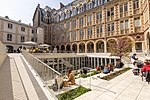
UCLouvain or Université catholique de Louvain is Belgium's largest French-speaking university. It is located in Louvain-la-Neuve, which was expressly built to house the university, and Brussels, Charleroi, Mons, Tournai and Namur. Since September 2018, the university has used the branding UCLouvain, replacing the acronym UCL, following a merger with Saint-Louis University, Brussels.

Catholic higher education includes universities, colleges, and other institutions of higher education privately run by the Catholic Church, typically by religious institutes. Those tied to the Holy See are specifically called pontifical universities.
A pontifical university is an ecclesiastical university established or approved directly by the Holy See, composed of three main ecclesiastical faculties and at least one other faculty. These academic institutes deal specifically with Christian revelation and related disciplines, and the Church's mission of spreading the Gospel, as proclaimed in the apostolic constitution Sapientiachristiana. As of 2018, they are governed by the apostolic constitution Veritatis gaudium issued by Pope Francis on 8 December 2017.

Paris-Panthéon-Assas University or Assas University, commonly known as Assas or Paris 2, is a university in Paris, often described as the top law school of France. It is considered as the direct inheritor of the Faculty of Law of Paris, the second-oldest faculty of Law in the world, founded in the 12th century.
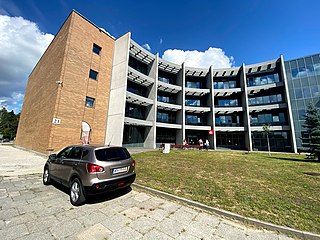
Cardinal Stefan Wyszyński University in Warsaw (UKSW) is a Polish state university created on the basis of the Academy of Catholic Theology in Warsaw. UKSW is a public university that offers education in the humanities, social studies, and natural sciences, and since 2019, medicine.
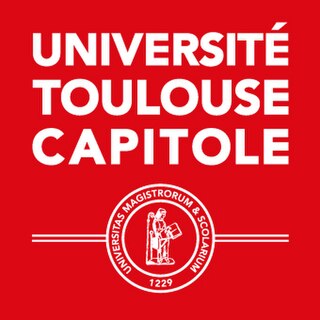
Toulouse Capitole University is a public university in Toulouse, France. It is one of the three universities of the city of Toulouse, in southwestern France. The university, presided by Hugues Kenfack, focuses on social sciences, law, political science, economics and administration. An active member of the federal University of Toulouse, it became an experimental public institution on January 1, 2023.
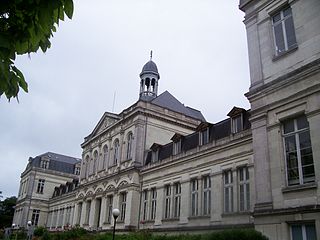
The Catholic University of the West, also known as UCO or colloquially as la Catho, is a university located in Angers, France.

Saint Joseph University of Beirut is a private Catholic research university located in Beirut, Lebanon, which was founded in 1875 by French Jesuit missionaries and subsidized by the Government of France during the time when Lebanon was under Ottoman rule. It is widely recognized as one of the leading and most prestigious academic institutions in Lebanon and Middle East. The institution boasts a diverse and accomplished group of alumni, who have gone on to become leading figures in politics, law, academia, literature, sciences, arts, medicine, and religion. USJ's impressive roster of graduates includes seven of independent Lebanon's thirteen Presidents, a Speaker of the Parliament of Lebanon, two Presidents of the Council of Ministers of Lebanon, Governors of the Banque du Liban, hundreds of legislators and ministers, numerous judges, and high-ranking civil servants, among them Commanders of the Lebanese Armed Forces and executives of the Internal Security Forces. As the oldest and foremost French university in Lebanon, it not only promotes Lebanese culture but also upholds a policy of equal admission opportunity without consideration of ethno-religious affiliations. Furthermore, it advocates trilingual education, offering instruction in Arabic, French, and English. Additionally, it is known in Lebanon and the Middle East for its prominent university hospital, the Hôtel-Dieu de France, and for its prestigious and historical Faculty of Law, modern Lebanon's oldest law school and the first law school in Lebanon since the ancient Roman law school of Berytus.

UCLouvain Saint-Louis Brussels is an autonomous university campus specialized in social and human sciences part of UCLouvain and based in Brussels, Belgium.
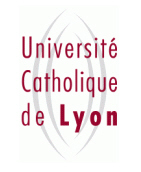
Catholic University of Lyon (UCLy), also known as the Lyon Catholic Institute,, is a private university based in Lyon and Annecy, France.

Alfred-Henri-Marie Baudrillart, Orat. was a French prelate of the Catholic Church, who became a Cardinal in 1935. A historian and writer, he served as Rector of the Institut Catholique de Paris from 1907 until his death. He campaigned to rouse international support for France during the First World War, while in the Second World War he supported the Vichy regime and backed the Germans for leading the international struggle against bolshevism.
The Catholic University of Central Africa is a private Roman Catholic university in Yaoundé, Cameroon.

The Institut Catholique de Toulouse is a Catholic university in Toulouse, France.

The Leuven Faculty of Theology was a branch of the Catholic University of Leuven, founded in 1834 in Mechelen by the bishops of Belgium as the Catholic University of Belgium, that moved its seat to the town of Leuven in 1835, changing its name to Catholic University of Leuven.
An ecclesiastical university is a special type of higher education school recognised by the Canon law of the Catholic Church. It is one of two types of universities recognised, the other type being the Catholic university. Every single ecclesiastical university is a pontifical university, while only a few Catholic universities are pontifical.
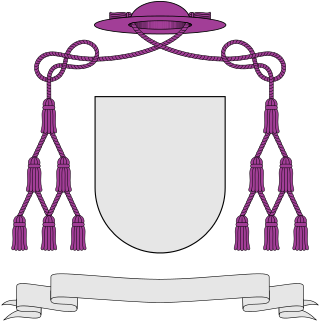
Philippe Bordeyne is a French priest, academic and theologian, and President of the John Paul II Pontifical Theological Institute for Marriage and Family Sciences. Bordeyne previously served as dean of Theologicum from 2006 to 2011 and rector of the Catholic Institute of Paris from 2011 to 2021.

The Catholic University of Madagascar is a private university located in Antananarivo, Madagascar. Founded in 1960 as an institute within the Major Seminary of Antananarivo, it later became an independent institute. It gained accreditation from the Malagasy government in 2000, and in 2011 took its present name.

The Louvain School of Engineering or École polytechnique de Louvain (EPL) is a faculty of the University of Louvain, Belgium, founded in 1864. Known as the Faculty of Applied Sciences prior to 2008, it currently operates on the campuses of Louvain-la-Neuve and UCLouvain Charleroi.
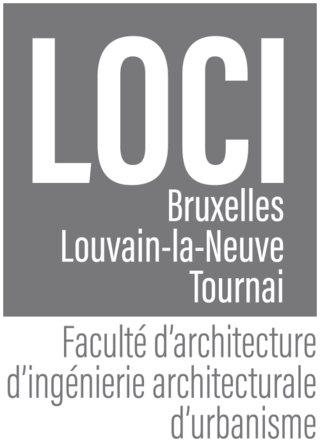
The Faculty of Architecture, Architectural Engineering and Urban Planning, often called LOCI, is the 14th faculty of the University of Louvain, Belgium. It became an independent faculty in 2009, with the merger of three institutes founded between 1867 and 1882, and is active in Brussels (Saint-Gilles), Tournai and Louvain-la-Neuve.

